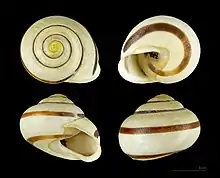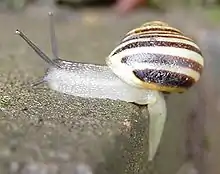White-lipped snail
The white-lipped snail or garden banded snail, scientific name Cepaea hortensis, is a medium-sized species of air-breathing land snail, a terrestrial pulmonate gastropod mollusc in the family Helicidae. It is a close relative of the Grove Snail.
| White-lipped snail | |
|---|---|
_on_rhododendron.jpg.webp) | |
| Scientific classification | |
| Kingdom: | Animalia |
| Phylum: | Mollusca |
| Class: | Gastropoda |
| Subclass: | Heterobranchia |
| Superorder: | Eupulmonata |
| Order: | Stylommatophora |
| Family: | Helicidae |
| Genus: | Cepaea |
| Species: | C. hortensis |
| Binomial name | |
| Cepaea hortensis (O. F. Müller, 1774)[1] | |
Shell description


The white-lipped snail is very slightly smaller than the grove snail, the shell being usually about 2.5 cm (1 in) in maximum dimension. Like the grove snail (brown-lipped snail), it has considerable variability in shell colour and banding, although the shell of the white-lipped snail is perhaps most commonly yellow, with or without brown banding. The principal distinguishing feature of this species is a white lip at the aperture of the shell in adult specimens, although very rarely the brown-lipped grove snail can have a white lip, and vice versa.[2]
Distribution
The native distribution of this species is Western Europe and Central Europe.[3] The range of the white-lipped snail extends closer to the Arctic in Northern Europe than the range of the grove snail. The white-lipped snail has been introduced to northeastern parts of the USA, but has not established itself as successfully as the brown-lipped snail.
Habitat
The two species share many of the same habitats, such as woods, dunes and grassland, but the white-lipped snail tolerates wetter and colder areas than the brown-lipped snail can.
Life cycle
This species of snail creates and uses love darts during mating.
The size of the egg is 2 mm.[4]
References
- Müller, O. F. 1774. Vermivm terrestrium et fluviatilium, seu animalium infusoriorum, helminthicorum, et testaceorum, non marinorum, succincta historia. Volumen alterum. - pp. I-XXVI [= 1-36], 1-214, [1-10]. Havniae & Lipsiae. (Heineck & Faber).
- Simon Whipps, July 2009; last updated July 2009. Life & Environment, University of the West of Scotland; BIODIVERSITY REFERENCE - Cepaea nemoralis and Cepaea hortensis
- Kerney M.P. & Cameron R. A. D., 1979. “A field guide to the land snails of Britain and northwestern Europe’’, Collins, London. ISBN 0-00-219676-X
- Heller J. 2001: Life History Strategies. in Barker G. M. (ed.): The biology of terrestrial molluscs. CABI Publishing, Oxon, UK, 2001, ISBN 0-85199-318-4. 1-146, cited page: 428.
External links
| Wikimedia Commons has media related to Cepaea hortensis. |
- Cepaea hortensis at Animalbase taxonomy, short description, distribution, biology, status (threats), images
- Cepaea hortensis images at Encyclopedia of Life
- Images of shell variations in C. hortensis
- Snail white - Images of shell variations in C. hortensis Thai language translate